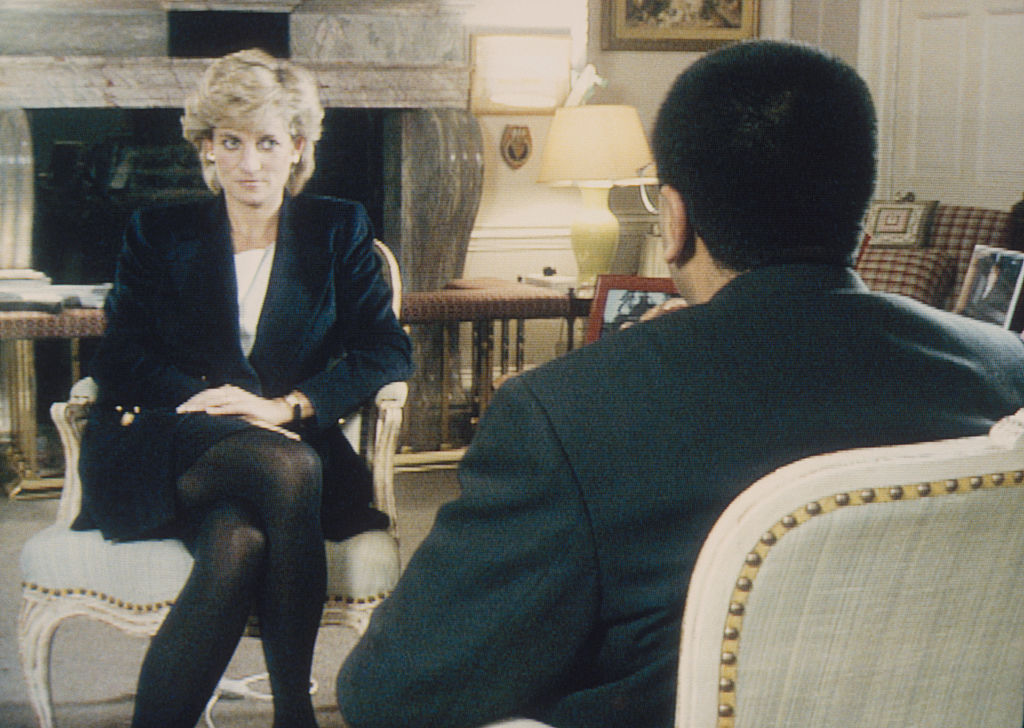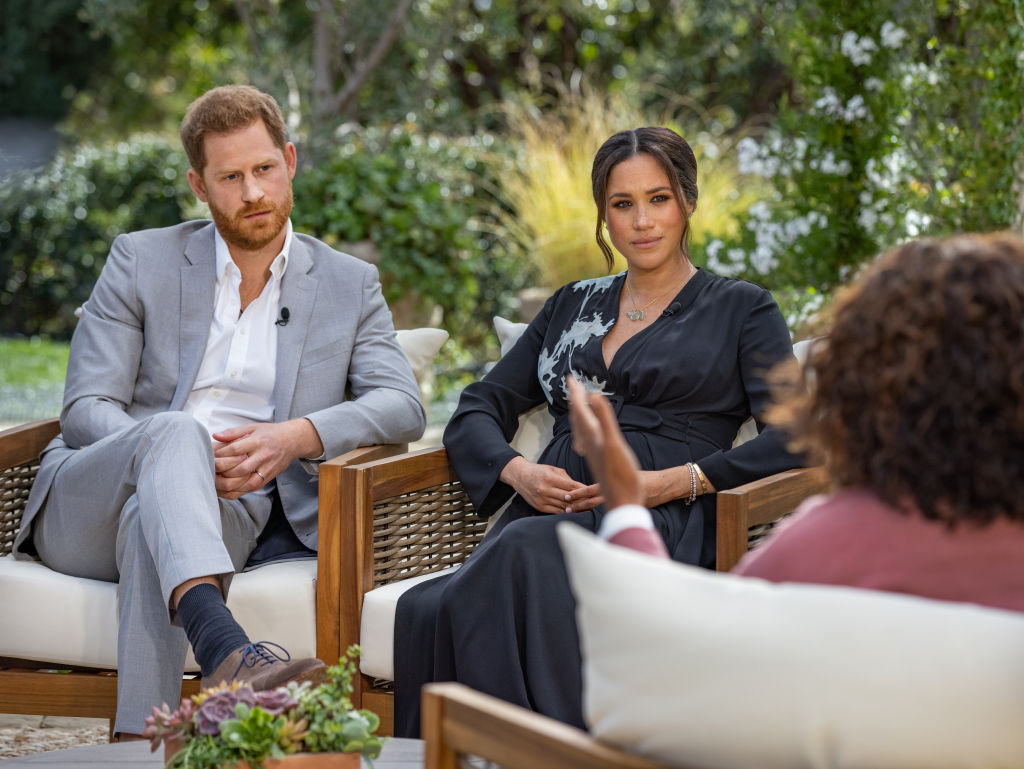
During Oprah Winfrey’s revealing interview on Sunday night, Prince Harry drew parallels between the experiences of his mother, the late Princess Diana, and his wife Meghan Markle’s harrowing treatment as part of the royal family.
“My biggest concern was history repeating itself. I’ve said that before on numerous occasions, very publicly,” he told Winfrey, adding that he feared Markle’s situation was “far more dangerous” because of her race and the power of social media.
But history was repeating itself in another clear way, as well: with the interview itself. More than 25 years ago, Diana paved the way for Harry and Markle’s startling accusations of the racism and hostile treatment by the Palace when she gave a bombshell interview to the BBC’s Panorama TV show.
History repeats itself—on TV

At the time, Diana was separated but not divorced from Prince Charles, who had just given a televised interview of his own months earlier to journalist Jonathan Dimbledy in which he admitted to infidelity—a revelation that fueled cruel tabloid coverage and made Diana’s personal pain public.
So Diana took matters into her own hands, arranging an interview on the BBC’s premier news program, without notifying Queen Elizabeth. It’s a tactic that Markle and Harry also deployed ahead of their interview—although after the Oprah special was announced, Buckingham Palace launched what appeared to some to be a preemptive response by announcing that it was investigating claims that Markle bullied staffers.
Both interviews disclosed deeply personal admissions that gave an intimate look into the inner workings of the Palace—and by doing so, brought very private allegations against the Royal Family into the mainstream. The similarities between the interviews were such that a clip of Diana’s 1995 interview went viral on Twitter Sunday, racking up some 1.8 million views.
In her tell-all, Diana famously confirmed to journalist Martin Bashir that she knew about Prince Charles’ affair with his now-wife Camilla Parker-Bowles with a darkly humorous quip: “There were three of us in this marriage, so it was a bit crowded.” For Harry and Markle, the revelations centered on the racism Markle, who identifies as biracial, has suffered since becoming a part of the royal family—and the damaging effects of the family’s apparent unwillingness to defend her from the U.K.’s tabloid press.
In both interviews, the royals spoke candidly to the very real mental health struggles stemming from the pressures of their public jobs—with Diana disclosing that she suffered from bulimia and had tried to self-harm during a dark period of postpartum depression and Markle revealing that she went to the Palace after experiencing suicidal thoughts, but was denied help.
Read more: Meghan Markle Calls the British Royals ‘The Firm.’ Here’s Why
But ultimately, both interviews were last resort bids for freedom from an institution that seemed to them more concerned with convention and keeping face than supporting their needs. Diana spoke openly about how when she was struggling with her eating disorder, she was shamed for wasting food, as opposed to getting the help she needed.
“I was crying out for help, but giving the wrong signals, and people were using my bulimia as a coat on a hanger: they decided that was the problem — ‘Diana was unstable,'” she said.
For Harry, the Palace’s passive stance on the racist harassment that Markle faced encapsulated the harmful rigidity of following tradition just because of royal status quo.
“For the family, they very much have this mentality of: ‘This is just how it is. This is how it’s meant to be. You can’t change it. We’ve all been through it,'” he said.
The cost of speaking out
That’s not to say that there weren’t consequences for sharing their stories.
The controversial Panorama interview has been the subject of allegations that Bashir coerced the Princess into the interview under false pretenses, leading to an independent investigation of the circumstances by the BBC. It also resulted in the Queen ordering Diana and Charles to divorce. While this freed Diana from an unhappy union, it also resulted in Diana losing her “Her Royal Highness” title and the security that came with it. Less than two years after the interview, Diana died in a car crash in Paris—the result of relentless pursuit by paparazzi photographers.
Read more: Meghan Markle and Prince Harry Tell Oprah: Racism Drove Us From the Royal Family
However, the interview ultimately allowed Diana’s unfiltered voice to be heard. She spoke earnestly and openly about her struggles with royal life and her fractured marriage to a man who she suggested wasn’t fit to be king. The broadcast allowed her to tell her side of the story with dignity and humanity—providing a stark contrast to the unrelenting and often cruel tabloid coverage of her, and providing a lens that showed cracks in a picture-perfect fairy tale.
It’s an example that Markle and Harry followed successfully with their Oprah interview, with Harry disclosing that he lost his security detail and was cut off financially. The more illuminating details were revealed with his recounting of familial tension: his refusal to say which member of the royal family had “concerns” over his unborn son’s complexion (though ruling out the Queen and Prince Philip), his assertion he and brother Prince William were giving each other “space,” and his accusation that his father, Charles, refused to take his calls after he made the decision to step back from Royal duties.
Read more: Column—Meghan and Harry’s Interview Won’t End the Monarchy. But a Reckoning Is Coming
Harry and Markle’s decision to walk away from royal life, was one they had the freedom to make because of what had Diana left them, both financially and spiritually. “I certainly felt her presence throughout this whole process,” he said. “I think she would feel very angry with how this has panned out and very sad. But ultimately, all she’d ever want is for us to be happy.”
But one difference may be emerging. While Diana’s Panorama interview resulted in her being cast out of the royal family, there are signs that the Queen may be responding to the Oprah interview by reaffirming that Harry and Markle are still a part of it.
In a statement issued Tuesday, the Queen vowed to “address” the allegations made in the interview, and also affirmed: “Harry, Meghan and Archie will always be much loved family members.”
More Must-Reads From TIME
- The 100 Most Influential People of 2024
- The Revolution of Yulia Navalnaya
- 6 Compliments That Land Every Time
- What's the Deal With the Bitcoin Halving?
- If You're Dating Right Now , You're Brave: Column
- The AI That Could Heal a Divided Internet
- Fallout Is a Brilliant Model for the Future of Video Game Adaptations
- Want Weekly Recs on What to Watch, Read, and More? Sign Up for Worth Your Time
Write to Cady Lang at cady.lang@timemagazine.com